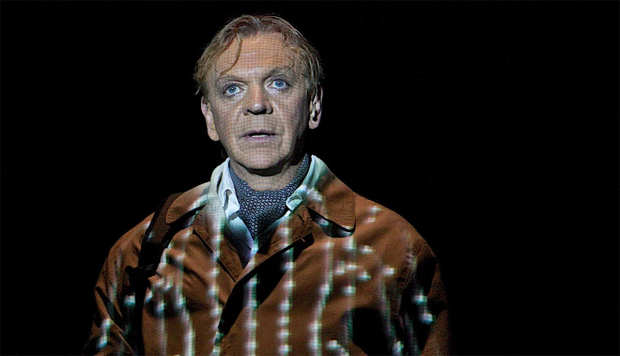Review: 887 (Barbican Centre)
Robert Lepage is an amazingly complete theatrical conjurer. He takes an idea and adds several more, and then transforms the whole pile into a magical otherness, full of tricks that are never less than revealing and often take the breath away.
His autobiographical one-man show 887 is a case in point. It began, as he reveals with deceptive casualness, walking onto the stage with the house lights up, when he agreed to memorise and perform Québécois writer Michèle Lalonde’s powerful Speak White, a poem about linguistic oppression, at an important poetic anniversary in Montreal.
Then he discovers that try as he might, he cannot remember the lines. So he begins to ask questions about memory, both personal and collective, and as he does he remembers his childhood at 887 Murray Avenue. Outside the walls, it was the height of the Free Quebec movement, with their slogans and kidnappings. Inside, his bi-lingual taxi driver father was marginalised and forgotten as he struggled to provide for Robert and his three siblings, squashed into a three bedroom apartment alongside their mother and a grandmother suffering from dementia.
As Lepage talks, the lights go down, and in a stroke of audacity, the cube on which he is standing turns to reveal itself as a six foot high doll’s house model of the apartment block, with each window showing an animated glimpse of the inhabitants’ lives: the Great Dane called Hamlet barking on the balcony, the woman with OCD cleaning obsessively; the man with "shattered legs and a shattered heart" who plays Chopin in the dark.
It is magical and from that moment Lepage has you in the palm of his hand. The set later opens up to become his life-sized kitchen, where he harangues an invisible friend who has fallen on hard times, to let him hear the ‘cold cut’ radio obituary the acquaintance has prepared. Or it becomes a screen, on which Lepage’s own face looms large as he uses models to recreate his childless aunt’s pristine apartment, or the moment when General de Gaulle arrives in Quebec to support liberation and drives in his Lincoln past the waving crowds.
These moments of technical wizardry – courtesy of the Ex Machina design team – are truly wonderful. But what is so impressive is that they all serve the development of Lepage’s themes, the way time itself plays tricks with what you remember and why, and the danger of a country losing its sense of itself in the overlay of present on a complex past.
Lepage expresses these thoughts, like the master story teller he is, in a script that blends humour (the self-mockery of the moments where he reacts in fury to the populist nature of his obituary is very funny indeed), history, science, and reflection in a seamless whole. The piece builds, almost without you sensing it, to a devastating conclusion where Lepage’s father – entrancingly remembered in scenes where Lepage himself embodies him as a shadow, as a presence, surrounded by music and melancholy – provides the key to unlocking the story. It is sensational.
887 runs at the Barbican Centre until 10 June.











